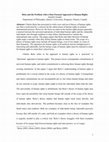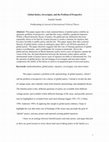Papers by Jennifer Szende
Journal of Global Ethics, Jan 2, 2022
Springer eBooks, 2011
The harm principle is a liberty-limiting principle in the sense that it justifies interference or... more The harm principle is a liberty-limiting principle in the sense that it justifies interference or coercion from the state in order to prevent individuals from harming others. The principle is predicated on the value of autonomy, the idea that individuals who are mentally competent and of legal age are best suited to decide for themselves how to References

Charles Beitz has presented us with a new and novel theory of human rights, one that is motivated... more Charles Beitz has presented us with a new and novel theory of human rights, one that is motivated by a concern for the enforcement of human rights in modern international practice. However, the focus on states in his human rights project generates a tension between the universal aspirations of individual human rights and the vulnerable individuals who through rendition or state failure find themselves outside the international state system. This paper argues that Beitz and other theorists of human rights make a mistake when they define human rights in statist terms. The scope of a theory of human rights must include all human beings, even if not simply in virtue of their humanity. The aspiration for human rights to be political and not metaphysical is interesting and admirable, but the human scope of human rights must be retained in order for human rights to retain their critical force
Apa Newsletter on Feminism and Philosophy, 2020

Journal of International Political Theory, 2019
This article argues that a state-centered theory of global justice exhibits an epistemic problem ... more This article argues that a state-centered theory of global justice exhibits an epistemic problem of perspective, and that this worry exhibits a gendered character. Within a liberal domestic theory of justice, the public/private distinction has been repeatedly shown to be bad for women because it creates a domain for injustice that becomes invisible to public policy and the law. This article argues that state-centered theories of global justice create an analogous space that is cut off from questions of global justice. The article therefore suggests that this way of framing questions of global justice is problematic, and is problematic for women in particular. Just as the public/private distinction in liberal domestic justice leaves cases of injustice outside the vision of the law, the hard distinction between the domestic (state) sphere and the international realm of justice leaves cases of injustice invisible to international law. For the question of global justice, the privileging of sovereignty and non-intervention compromises the ability of the theory to achieve its purported goal of universal justice.

Journal of Global Ethics, 2012
This paper examines four interpretations of the observation that humanitarian intervention might ... more This paper examines four interpretations of the observation that humanitarian intervention might be used ‘selectively’ or ‘inconsistently’ in order to elucidate the normative commitments of the deliberative process in international relations. The paper argues that there are several types of concerns that are implicit in the accusation of inconsistency, and only some of them amount to objections to humanitarian intervention as a whole. The paradox of humanitarian intervention is that intervention is prohibited except where the intervention is humanitarian, yet humanitarian reasons never exist in isolation, and it is nearly impossible to determine the real reason for intervention (or any other collective action) in the international arena. The problems revealed by an examination of inconsistency in the example of humanitarian intervention turn out to be general problems with applying the norms of practical reasoning to moral questions dealing with collective agents.
Encyclopedia of Global Justice, 2011
Journal of Moral Philosophy
Encyclopedia of Global Justice, 2011
Encyclopedia of Global Justice, 2011
Journal of Moral Philosophy, 2011

Journal of International Political Theory, 2019
This paper argues that a state-centered theory of global justice exhibits an epistemic problem of... more This paper argues that a state-centered theory of global justice exhibits an epistemic problem of perspective, and that this worry exhibits a gendered character. Within a liberal domestic theory of justice, the public/private distinction has been repeatedly shown to be bad for women because it creates a domain for injustice that becomes invisible to public policy and the law. This paper argues that state-centered theories of global justice create an analogous space that is cut off from questions of global justice. The paper therefore suggests that this way of framing questions of global justice is problematic, and is problematic for women in particular. Just as the public/private distinction in liberal domestic justice leaves cases of injustice outside the vision of the law, the hard distinction between the domestic (state) sphere and the international realm of justice leaves cases of injustice invisible to international law. For the question of global justice, the privileging of sovereignty and non-intervention compromise the ability of the theory to achieve its purported goal of universal justice.
Encyclopedia of Global Justice, 2011
Jennifer Szende Postdoctoral Fellow, CRÉ Forthcoming in Jill Dieterle (Ed.) Just Food: Philosophy... more Jennifer Szende Postdoctoral Fellow, CRÉ Forthcoming in Jill Dieterle (Ed.) Just Food: Philosophy, Justice, and Food London:

Journal of Global Ethics, Apr 2012
This paper examines four interpretations of the observation that humanitarian intervention might ... more This paper examines four interpretations of the observation that humanitarian intervention might be used ‘selectively’ or ‘inconsistently’ in order to elucidate the normative commitments of the deliberative process in international relations. The paper argues that there are several types of concerns that are implicit in the accusation of inconsistency, and only some of them amount to objections to humanitarian intervention as a whole. The paradox of humanitarian intervention is that intervention is prohibited except where the intervention is humanitarian, yet humanitarian reasons never exist in isolation, and it is nearly impossible to determine the real reason for intervention (or any other collective action) in the international arena. The problems revealed by an examination of inconsistency in the example of humanitarian intervention turn out to be general problems with applying the norms of practical reasoning to moral questions dealing with collective agents.
Journal of Moral Philosophy, Nov 2011
Journal of Moral Philosophy, Jan 1, 2006











Uploads
Papers by Jennifer Szende